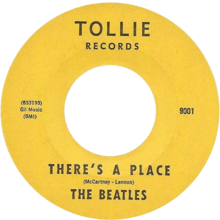There's a Place
"There's a Place" is a song co-written by John Lennon and Paul McCartney and first released as a track on the Beatles' debut LP, Please Please Me. Lennon and McCartney share lead vocals, with George Harrison providing backing vocals. In the US it was released on Introducing... The Beatles (Vee-Jay Records) and as the B-side of "Twist and Shout", and was finally released by Capitol Records on Rarities in 1980.
| "There's a Place" | ||||
|---|---|---|---|---|
 B-side label of original US single "Twist and Shout" | ||||
| Single by the Beatles | ||||
| from the album Please Please Me | ||||
| A-side | "Twist and Shout" | |||
| Released | 22 March 1963 2 March 1964 (US) | |||
| Recorded | 11 February 1963 | |||
| Studio | EMI, London | |||
| Genre | ||||
| Length | 1:49 | |||
| Label |
| |||
| Songwriter(s) | McCartney–Lennon | |||
| Producer(s) | George Martin | |||
| The Beatles US singles chronology | ||||
| ||||
Origins
The title was inspired by Leonard Bernstein and Stephen Sondheim's "Somewhere" from West Side Story, which contained the line: "There's a place for us." McCartney admits owning the album of the film's soundtrack at the time of writing "There's a Place" and acknowledges its influence.[1] The song's subject matter was pitched on higher intellectual plane than most pop songs of that period, as Lennon explained: "'There's a Place' was my attempt at a sort of Motown, black thing. It says: 'In my mind there's no sorrow...' It's all in your mind."[2] McCartney is quoted as saying: "In our case the place was in the mind, rather than round the back of the stairs for a kiss and a cuddle. This was the difference with what we were writing: we were getting a bit more cerebral. We both sang it. I took the high harmony, John took the lower harmony or melody. This was a nice thing because we didn't actually have to decide where the melody was till later when they boringly had to write it down for sheet music."[1] Composed at McCartney's Forthlin Road home, it was part of the group's stage repertoire in 1963.[3] With its major seventh harmonica intro (later reprised) and searing two-part vocal harmonies, it stands out as an early Beatles milestone track. The song was recorded on 11 February 1963 in 10 takes during the first of three sessions for Please Please Me.[4] It was later overdubbed with a harmonica in 3 takes.[4]
The song was officially credited to "McCartney–Lennon", as were all other Lennon–McCartney compositions on the original UK release of Please Please Me.
Personnel
- John Lennon – vocals,[5] rhythm guitar, harmonica
- Paul McCartney – vocals, bass
- George Harrison – lead guitar, backing vocals
- Ringo Starr – drums
Engineered by Norman Smith
- Personnel per Ian MacDonald[6]
Cover versions
- A cover version was released by the Flamin' Groovies.
- The Smithereens also released a cover on their 2008 album, B-Sides The Beatles.[7]
- Latin American Rock legend Charly García recorded a version for his live album, Estaba en llamas Cuando Me Acosté (1995).
- A cover version was released by US punk band, the Dickies, on their 1998 album, Dogs From the Hare that Bit Us.
- Gabrielle Aplin sang a cover for the BBC during a rerecording challenge for the Beatles' Please Please Me album.
Cultural legacy
It was used at the start of Daniel Farson's Associated-Rediffusion documentary Beat City, a portrait of Liverpool which was shown at Christmas 1963.
Notes
- Miles 1998, p. 95.
- MacDonald 2005, pp. 65–66.
- Harry 1992, p. 649.
- Lewisohn 1992, p. 99.
- The Beatles 10 Years that Shook the World book only credits Lennon as lead singer
- MacDonald 2005, p. 65.
- Deming, Mark. B-Sides the Beatles at AllMusic. Retrieved December 27, 2016.
References
- Harry, Bill (1992). The Ultimate Beatles Encyclopedia. London: Virgin Books. ISBN 0-86369-681-3.CS1 maint: ref=harv (link)
- Lewisohn, Mark (1992). The Complete Beatles Chronicle. London: Hamlyn. ISBN 0-600-61001-2.CS1 maint: ref=harv (link)
- MacDonald, Ian (1998). Revolution in the Head. London: Pimlico. ISBN 0-7126-6697-4.CS1 maint: ref=harv (link)
- MacDonald, Ian (2005). Revolution in the Head: The Beatles' Records and the Sixties (Second Revised ed.). London: Pimlico (Rand). ISBN 1-84413-828-3.CS1 maint: ref=harv (link)
- Miles, Barry (1998). Paul McCartney: Many Years from Now. London: Vintage Books. ISBN 0-7493-8658-4.CS1 maint: ref=harv (link)